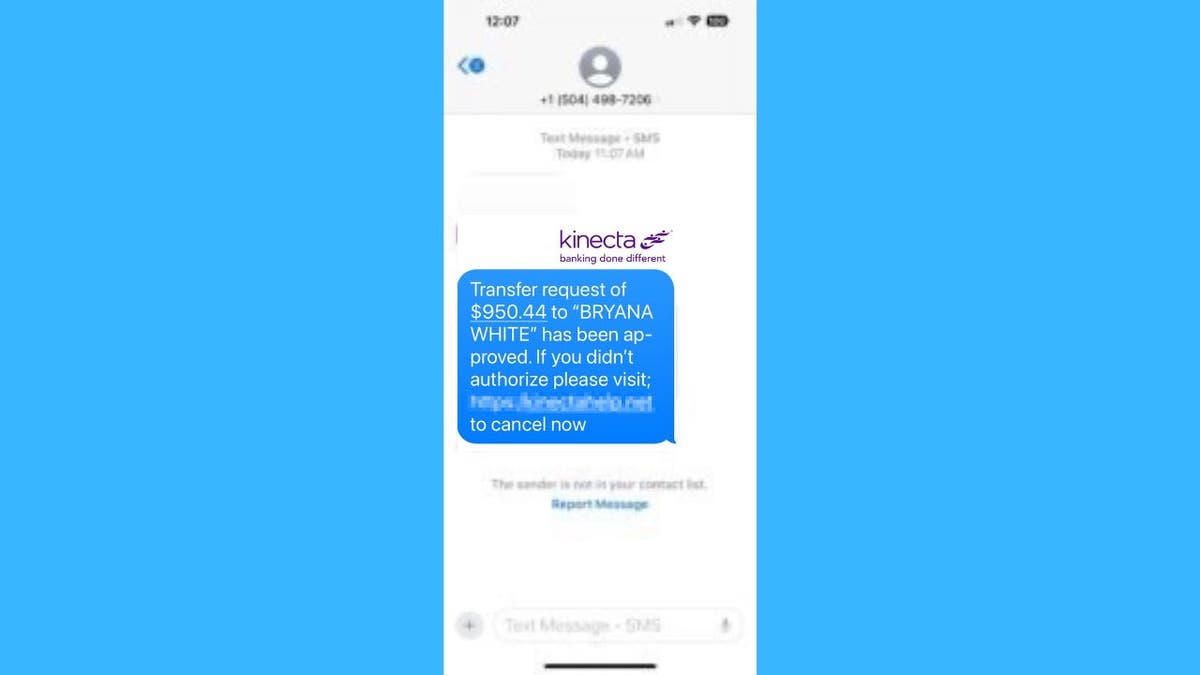We recently received an email from Jane, who wrote to us about a suspicious text message she received.
Her experience serves as a crucial reminder for all of us to stay alert in the face of these evolving digital threats.
Let’s dive into Jane’s encounter and explore what it means for our financial safety in 2025.
STAY SAFE & IN THE KNOW — AT NO COST! SUBSCRIBE TO KURT’S THE CYBERGUY REPORT FOR FREE SECURITY ALERTS & TECH TIPS
Jane’s alarming text: A textbook scam attempt
Jane wrote to us with the following concern:
“I just got a text from Kinecta here in California that says, ‘Transfer request of $950.44 to BRYANA WHITE has been approved. If you didn’t authorize please visit (link here) to cancel now.’ Is this a scam text? Should I be worried?”
Excellent question, Jane! Your caution is commendable, and, yes, you should be concerned. Let’s break down this scam attempt and see why it raises so many red flags.

BEST ANTIVIRUS FOR MAC, PC, IPHONES AND ANDROIDS – CYBERGUY PICKS
Red flags: Spotting the scam
Jane’s text message exhibits several telltale signs of a scam that everyone should be aware of:
Urgency as a weapon: Scammers exploit our fear of financial loss to prompt hasty actions. They use phrases like, in this case, “Act now” or “Cancel Now” and warn of dire consequences if immediate action isn’t taken. This urgency is designed to bypass rational thinking and prevent you from verifying the legitimacy of the request.
Suspicious links: Legitimate banks avoid sending security-sensitive links via text. These links could download viruses to your device or lead you to a fake website designed to steal your personal information. Always verify the URL before entering any sensitive data.
Specific yet unfamiliar details: The mention of “Bryana White” and the precise amount of $950.44 is a clever tactic. Scammers often use specific details to create an illusion of legitimacy, even when these details are unfamiliar to the recipient. This approach aims to instill doubt and urgency, increasing the chances that the victim will act hastily.
WHAT IS ARTIFICIAL INTELLIGENCE (AI)?
Brand impersonation: Scammers often employ brand impersonation tactics, using similar logos, fonts and color schemes to create a facade of legitimacy. This deceptive strategy is designed to manipulate you into believing you are interacting with a trusted institution, thereby increasing the likelihood of falling for their scam.
Unsolicited contact: Be wary of unexpected texts claiming to be from your bank, especially if you haven’t signed up for text alerts.
Spelling and grammatical errors: Look for mistakes in spelling, grammar or punctuation. Legitimate messages from banks are usually written by professionals and are free of errors.
Requests for personal information: Scammers often ask you to “confirm” details like your account number or password. Legitimate banks never request sensitive information via text.
Too good to be true offers: Be skeptical of messages promising large returns or unexpected windfalls.
Pressure tactics: Scammers often use threatening language or impose tight deadlines to manipulate you into acting quickly without thinking.

HOW TO FIGHT BACK AGAINST DEBIT CARD HACKERS WHO ARE AFTER YOUR MONEY
The scammer’s playbook: Objectives unveiled
These digital deceivers have 3 clear goals in mind:
- Data theft: Luring you to fake websites to harvest login credentials.
- Malware distribution: Tricking you into downloading malicious software.
- Financial fraud: Manipulating you into revealing sensitive financial information.

9 WAYS SCAMMERS CAN USE YOUR PHONE NUMBER TO TRY TO TRICK YOU
How to protect yourself from text scams
As scammers become increasingly sophisticated, it’s crucial to arm yourself with knowledge and take proactive steps to safeguard your personal information. Here are seven essential tips to help you stay protected:
1. Never click suspicious links in text messages: In Jane’s case, clicking the link could have led to a fake Kinecta website designed to steal her login credentials.
2. Have strong antivirus software: This can help detect and block malicious software that might be downloaded if Jane had clicked on the scammer’s link. The best way to safeguard yourself from malicious links that install malware, potentially accessing your private information, is to have antivirus software installed on all your devices. This protection can also alert you to phishing emails and ransomware scams, keeping your personal information and digital assets safe. Get my picks for the best 2025 antivirus protection winners for your Windows, Mac, Android and iOS devices.
3. Contact your bank directly using official channels: Jane should call Kinecta’s official number to verify if there’s any real issue with her account, rather than responding to the text.
4. Report the text to your bank and forward it to 7726 (SPAM): By reporting this text, Jane can help Kinecta and her mobile carrier protect other customers from similar scams.
5. Enable two-factor authentication (2FA) on your accounts: This extra layer of security could prevent scammers from accessing Jane’s account even if they obtained her password.
6. Use SMS filtering tools provided by your mobile carrier: These tools might have caught and flagged the suspicious “Kinect” text before it reached Jane’s inbox.
7. Invest in personal data removal services: This can help reduce the amount of personal information available online, making it harder for scammers to target Jane and you with personalized attacks in the future. While no service promises to remove all your data from the internet, having a removal service is great if you want to constantly monitor and automate the process of removing your information from hundreds of sites continuously over a longer period of time. Check out my top picks for data removal services here.
Kurt’s key takeaways
Remember, legitimate financial institutions will never pressure you to act immediately or click on links in text messages. When in doubt, always reach out to your bank directly using official channels. Thank you, Jane, for bringing this to our attention. Your vigilance not only protected you but also helps educate others. Together, we can stay one step ahead of scammers and protect our finances.
What additional steps do you think governments, regulatory agencies like the FCC or cellular providers should take to stop the rise of scam texts and protect consumers from these malicious schemes? Let us know by writing us at Cyberguy.com/Contact
For more of my tech tips and security alerts, subscribe to my free CyberGuy Report Newsletter by heading to Cyberguy.com/Newsletter
Ask Kurt a question or let us know what stories you’d like us to cover
Follow Kurt on his social channels
Answers to the most asked CyberGuy questions:
New from Kurt:
Copyright 2025 CyberGuy.com. All rights reserved.
Read the full article here










